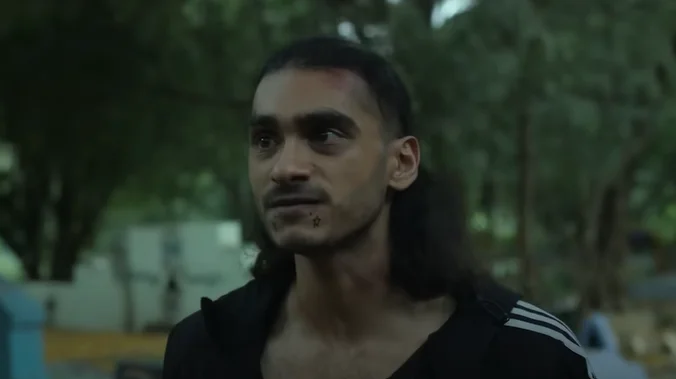Officer on Duty Review: Profitable but Problematic?
One of the few profitable films of this quarter, Officer on Duty has made its mark at the box office. However, after watching it on OTT (it is now streaming on Netflix)—where the larger-than-life cinematic appeal often takes a backseat—I found the film to be average at best. While it delivers on adrenaline-pumping action, the flaws become evident upon closer inspection. Here’s why I think Officer on Duty falls short in key areas:
A Weak and Inconsistent Storyline
The plot of Officer on Duty revolves around a gang of drug addicts who cheat women, kill their families, and even murder police officers with shocking ease—yet the authorities struggle to trace them. The believability factor here is incredibly low.
Also Read: Malayalam Movies on Netflix that You Can’t Miss
How is it that a group of criminals with no significant political backing manages to execute multiple killings so efficiently while leaving behind little to no trace? The police, despite their resources, remain clueless until several innocent lives are lost. The entire setup feels contrived for convenience rather than built on a solid narrative foundation.
Additionally, every female victim in the film meets the same fate—suicide by hanging—except for one, Inspector Joseph’s daughter. While her reasoning is somewhat explained (believing her secret is safe), the repetition of the same tragic end for multiple victims feels like lazy storytelling. More variation and depth in character arcs would have made the plot stronger.
Poorly Written Characters
From the very first scene, the film introduces us to its lead character, Harishankar in a jarring manner. He aggressively knees a woman in the crotch—an act meant to establish his hot-headed and ruthless personality. While Officer on Duty does not necessarily glorify this moment, it fails to critique it adequately. The audience is simply expected to accept this act as part of his tough persona without any further exploration of its implications. Compare this to Mumbai Police, where a similar act of misconduct immediately establishes the protagonist’s misogynistic tendencies through strong visual storytelling. Here, however, the moment lacks the depth necessary to convey a flawed yet introspective character.

The villains, a group of drug addicts, are similarly underdeveloped. They are reduced to one-dimensional stereotypes—tattoos, eccentric hairstyles, and exaggerated accents. But what is their backstory? Harishankar, the film’s lead, has some depth, but the criminals are left unexplored. How did they escape from prison? How did they rise to such a level of notoriety without significant connections? There’s a throwaway line from a nurse about two of the girls being brought in for de-addiction, but the film never follows up on it. This lack of backstory makes them feel more like caricatures than compelling antagonists.
Also Read: From Shammi to Mundakkal Shekharan – Iconic Villains in Malayalam Movies
The Problematic Use of “Revenge Rape” as a Plot Device
This might be an uncomfortable discussion, but it needs to be addressed.
The villains in Officer on Duty were subjected to sexual violence by a corrupt police officer. In response, their form of revenge is to sexually violate the daughters of everyone who had a hand in their misery. This includes the daughter of the officer who arrested them fairly and those who merely stood in their way. Their default mode of retribution is sexual violence, which is deeply disturbing and problematic.
Using sexual violence against women as a form of revenge in storytelling is not new, but it’s a trope that needs to be critically examined—especially in a society where gender-based violence is still a major issue. The idea that revenge is best served through sexual violence, particularly against innocent women, reinforces a toxic narrative. It perpetuates the notion that women’s bodies are battlegrounds, reducing sexual violence to a transactional act rather than addressing it as the horrifying crime that it is.
Some might argue that the antagonists are drug addicts and their depravity justifies this behavior within the story. However, the issue is not just the characters’ actions but the broader cultural messaging that normalizes rape as a form of narrative retribution. This kind of storytelling has real-world consequences, shaping societal perceptions of gender and justice in harmful ways.
A Missed Opportunity in Storytelling
Shahi Kabir, the writer of Officer on Duty, has previously crafted narratives with flawed yet realistic police characters, as seen in Nayattu. His experience as a former police officer often lends authenticity to his stories. In Officer on Duty, the protagonist Harishankar is a dynamic officer weighed down by his own traumatic past. Such portrayals break away from the hyper-masculine hero archetype and add layers of realism.
That being said, while the film successfully delivers thrilling action and has been a commercial success, its storytelling remains limited. The weak plot, underdeveloped characters, and problematic narrative choices prevent Officer on Duty from being truly great.
These are just my thoughts—what did you think about Officer on Duty? Let me know in the comments below.

I can’t stop talking about films, so I blog!
I started The FourthWall, my film blog, to share my thoughts on films and shows with fellow movie buffs, and over the years it has become my happy place. Come join in for some interesting conversations on cinema… and sometimes books and fashion!








